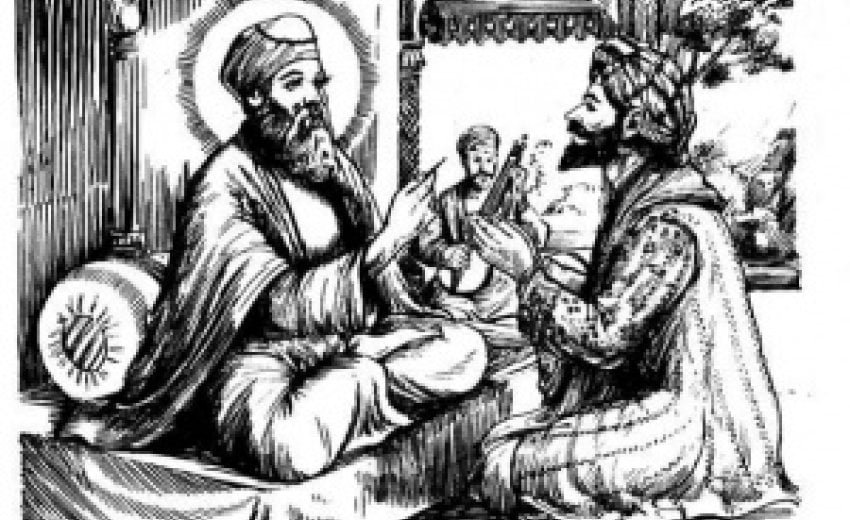On the day Guru Nanak arrived, Duni Chand was hosting a sharadh, a large feast that Hindus offer to Brahmans.
Guru Nanak, the first Guru and founder of the Sikh religion, traveled far and wide. During one of his journeys, he visited Lahore, a large town in Pakistan. There, a very wealthy man named Duni Chand lived. He was so rich that he had seven million rupees and displayed his wealth by putting seven flags on his house.
On the day Guru Nanak arrived, Duni Chand was hosting a sharadh, a large feast that Hindus offer to Brahmans. They believe that whatever they give to the Brahmans after the feast reaches their deceased ancestors in the next world. On this day, they prepare the best food and give away fine clothes and money, called Dakshana, to the Brahmans. Duni Chand had invited many Brahmans and saints to the sharadh in honor of his father, and he also invited Guru Nanak.
Guru Nanak sat down on one side and informed Duni Chand that he would wait until the Brahmans had finished their meal. Duni Chand agreed and provided a grand feast, offering money and clothes to the Brahmans as Dakshana, believing that these offerings would reach his deceased father. After the Brahmans had left, Duni Chand invited Guru Nanak to eat.
The Guru smiled and asked Duni Chand if he believed that his father was no longer hungry and if the gifts had reached him. Duni Chand confidently replied that the Brahmans had eaten enough food to satisfy his father for at least a year, and that his father now had enough money and clothes to last the same amount of time. Guru Nanak laughed and pointed out that the Brahmans had eaten the food and would sell the clothes and spend the money. He expressed his confusion as to how these offerings could reach Duni Chand's deceased father.
Duni Chand acknowledged, saying that neither he nor the Guru could understand the situation, but they accepted it as God's will, as the Brahman had told them. He added that he was relieved he didn't waste his food on someone who wasn't a Brahman. The Guru agreed with Duni Chand's decision, stating that he didn't want the food to go to waste. He mentioned that Duni Chand could feed the Brahmans in any way he liked, as the Guru himself did not need the food. Instead, the Guru requested a different favour.
Duni Chand agreed willingly. The Guru then handed Duni Chand a sewing needle, asking him to keep it and return it to the Guru in the next world after they both had died. This confused him. Duni Chand asked how he could carry the needle with him when he died.
Guru said, "If an old Brahman can carry enough clothes, food and money to last for a whole year, not only for your father but also for many others. I wonder why this small needle should seem too heavy for you to carry! If the Brahmans refuse to do this work, how will you take all your money, horses, gold and other costly things into the next world?"
The idea resonated with Duni Chand, prompting him to seek the Guru's advice. The Guru advised him to work hard, share his earnings with the needy, and remember God, rather than worrying about his deceased ancestors. Duni Chand responded that he already followed this practice. He explained that he had hundreds of servants, gave a lot of money and clothes to Brahmins and holy men, and welcomed those who sang hymns in his house.
The Guru pointed out that this was not the correct approach. He instructed Duni Chand to give all his money to the poor and needy, emphasizing that his wealth had not been earned through honest labour. The Guru encouraged Duni Chand to work on his farm alongside his servants, share the earnings equally among the workers, and donate a portion of his own share to charity. He advised Duni Chand to treat his servants as brothers, love everyone, and sing God's praises together whenever possible. The Guru explained that true rewards in the next world come from honest labour and charitable giving in this one.
Duni Chand took the Guru's advice to heart. He abandoned his princely lifestyle and began working with his own hands, with his wife doing the same. Their home transformed into a temple where people of all backgrounds—rich and poor, black and white, high and low—gathered to sing songs of God. Duni Chand and his wife became devoted followers of the Guru and helped many others embrace the Guru's teachings.
"Work hard and share your earnings with the needy Nanak; thus shall you find the way to God's grace."
(Satguru Sri Guru Nanak Dev Ji, the king of kings and the saint of saints)
*Based on an article by Kanwaljit Singh, published in tuhitublogpost on 6th November 2014

